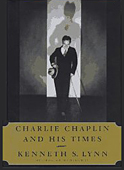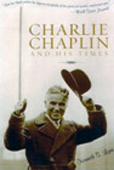
Books on the silent era of cinema.
Copyright © 1999-2025
by Carl Bennett
and the Silent Era Company.
All Rights Reserved. |
|
Charlie Chaplin
and His Times
By Kenneth S. Lynn
|


|
BOOK REVIEW
Charlie Chaplin and His Times
By Kenneth S. Lynn
Simon & Schuster : New York, New York : 1997
Hardcover Edition : ISBN 978-068480851X : 608 pages
$35.00
Cooper Square Press : New York, New York : 2003
Trade Paperback Edition : ISBN 978-081541255X : 607 pages
$19.95
Reviewed by Carl Bennett
|
|
Charles Chaplin was not the easiest filmmaker to work for. Charlie was not the closest of friends. Chaplin was not a sterling example of a family man. Yet, we suspect that he was also not the cold, tyrannical lout that Kenneth Lynn portrays him as — either at the studio or at home. Not withstanding Lynn’s academic credentials and the glowing quotations from reviews of this work that are reprinted on the cover of the paperback edition, Lynn seems less concerned with examining Chaplin’s life and work than with demystifying the Cult of Charlie. And it is not my choice that Kenneth Lynn be the one to presume to do that for me.
The biography is curiously nasty in places, as conservative Lynn seems to want to punish the public memory of Chaplin for his liberal (and naïve) political positions of the 1920s through the 1950s. Lynn takes several opportunities to imply to the reader his own political savvy when he points out how stupid Chaplin’s own political explorations were. Certainly, Chaplin did not discern the motives of those who sought to exploit his fame, accurately gauge the limits of his own intellect, or fully examine the merits of the moral and political positions that he tersely injected into his later films. The truth of what Lynn observes and attempts to impart upon the reader is distorted by his kaleidoscopic political eyeglasses. His tone of impartiality is lost often enough that the reader is left to wonder whether Lynn can be trusted to pronounce what is true and what is Chaplin fantasy.
The book is well and succinctly titled as Lynn on occasion swerves to a side topic of historical socio-political relevance to the time period or the facts currently being discussed and imbues the reader with additional insight that other biographers are prone to ignore. Yet, Lynn superficially discusses Chaplin’s oeuvre and inescapably reveals that his own preoccupation is with political history than with cinema history.
Is Lynn’s book the worst biography of Chaplin? Not by a long shot. That mantle must be worn by any of the legion of substandard Chaplin biographies written in the last eight decades. Is this the best Chaplin biography? No way. Lynn’s book may well be a more-accurate accounting of Chaplin’s own life than is Charlie’s own autobiography, but Lynn occupies only a moderately notable place among the pantheon of Chaplin biographers. For all his reverently-touted research and his scholarly tone, Lynn’s unique perspective on the life of Charles Chaplin may only be enjoyed by those who share the late professor’s conservative political views.
|
|
This book is available through . . .
|

|
|
|
|
Silent Era Home Page > Books > Charlie Chaplin and His Times
|




































